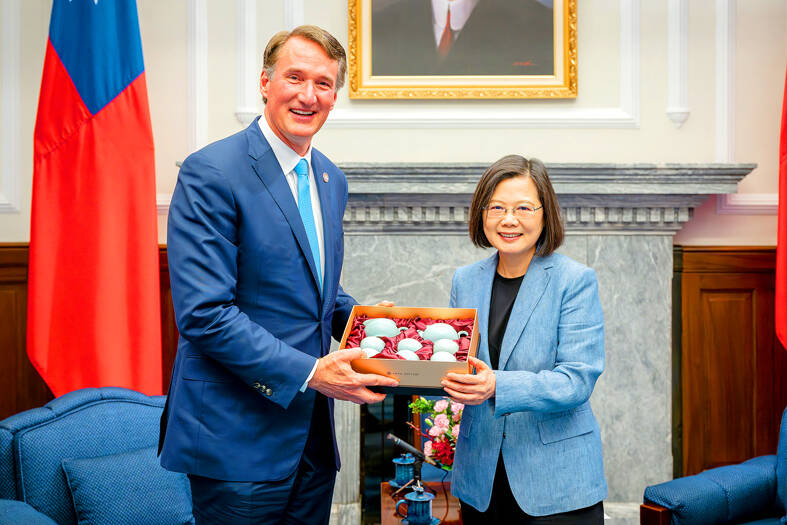A Virginia-Taiwan Trade Office is to open in Taiwan in the hope of boosting economic ties with the nation, visiting Virginia Governor Glenn Youngkin said yesterday.
Youngkin made the announcement during a meeting with President Tsai Ing-wen (蔡英文) at the Presidential Office in Taipei, saying that he had just signed an executive order for the new trade office to be established in Taiwan.
“This is Virginia’s fourth international trade office joining others in Germany, South Korea and Japan, and represents an enduring commitment to fostering collaboration and enhancing our ties with Taiwan,” he said.

Photo: EPA-EFE / Makoto Lin / Presidential Office
The Virginia General Assembly voted in support of a proposal to open a trade office in Taiwan in February after the case gained support from the Senate of Virginia earlier the same month, he said, adding that the decision demonstrates Virginia’s strong commitment to cooperating with Taiwan.
Following the inauguration earlier this year of the Virginia-Taiwan Friendship Caucus, the state would continue to bolster ties with Taiwan, he added.
Virginia is the biggest exporter to Taiwan among all US states, with exports growing 27 percent from 2020 to last year, while it imports more than US$1 billion of products from Taiwan every year, Youngkin said.
Taiwanese businesses in Virginia have demonstrated the strength of the nation’s manufacturing industry, especially semiconductors and electronic technology, he said.
Virginia’s location, solid information and communication infrastructure, and abundant scientific and technological talent make it an ideal location for the semiconductor industry, he added.
The Port of Virginia, which serves as the “heart” of Virginia’s economy, coupled with the new trade office would significantly increase the volume of goods moving into and out of the state, benefiting both Taiwan and Virginia, Youngkin said.
Youngkin is leading an international trade mission to Asia for the first time since taking office in January last year.
He arrived in Taiwan yesterday and is also planning to visit Japan and South Korea today, the Ministry of Foreign Affairs said in a statement.
Tsai thanked the governor for supporting Taiwan, citing the plan to establish a trade office and a resolution passed by the Virginia General Assembly in February supporting the nation’s international participation.
Taiwan and Virginia have long worked closely on trade, education and culture, one example being renewing a memorandum of understanding on language education for the second time in August last year, she said.
The visit could open up more opportunities for the two sides to cooperate in diverse ways, and continue to bolster ties in industry and technology, she added.
Youngkin was also to sign a memorandum of understanding with the Ministry of Economic Affairs, and exchange ideas with the Taiwan External Trade Development Council and businesspeople to explore opportunities for economic and trade cooperation, the Ministry of Foreign Affairs said.
Additional reporting by CNA

Taiwan is projected to lose a working-age population of about 6.67 million people in two waves of retirement in the coming years, as the nation confronts accelerating demographic decline and a shortage of younger workers to take their place, the Ministry of the Interior said. Taiwan experienced its largest baby boom between 1958 and 1966, when the population grew by 3.78 million, followed by a second surge of 2.89 million between 1976 and 1982, ministry data showed. In 2023, the first of those baby boom generations — those born in the late 1950s and early 1960s — began to enter retirement, triggering

ECONOMIC BOOST: Should the more than 23 million people eligible for the NT$10,000 handouts spend them the same way as in 2023, GDP could rise 0.5 percent, an official said Universal cash handouts of NT$10,000 (US$330) are to be disbursed late next month at the earliest — including to permanent residents and foreign residents married to Taiwanese — pending legislative approval, the Ministry of Finance said yesterday. The Executive Yuan yesterday approved the Special Act for Strengthening Economic, Social and National Security Resilience in Response to International Circumstances (因應國際情勢強化經濟社會及民生國安韌性特別條例). The NT$550 billion special budget includes NT$236 billion for the cash handouts, plus an additional NT$20 billion set aside as reserve funds, expected to be used to support industries. Handouts might begin one month after the bill is promulgated and would be completed within

NO CHANGE: The TRA makes clear that the US does not consider the status of Taiwan to have been determined by WWII-era documents, a former AIT deputy director said The American Institute in Taiwan’s (AIT) comments that World War-II era documents do not determine Taiwan’s political status accurately conveyed the US’ stance, the US Department of State said. An AIT spokesperson on Saturday said that a Chinese official mischaracterized World War II-era documents as stating that Taiwan was ceded to the China. The remarks from the US’ de facto embassy in Taiwan drew criticism from the Ma Ying-jeou Foundation, whose director said the comments put Taiwan in danger. The Chinese-language United Daily News yesterday reported that a US State Department spokesperson confirmed the AIT’s position. They added that the US would continue to

The National Development Council (NDC) yesterday unveiled details of new regulations that ease restrictions on foreigners working or living in Taiwan, as part of a bid to attract skilled workers from abroad. The regulations, which could go into effect in the first quarter of next year, stem from amendments to the Act for the Recruitment and Employment of Foreign Professionals (外國專業人才延攬及僱用法) passed by lawmakers on Aug. 29. Students categorized as “overseas compatriots” would be allowed to stay and work in Taiwan in the two years after their graduation without obtaining additional permits, doing away with the evaluation process that is currently required,